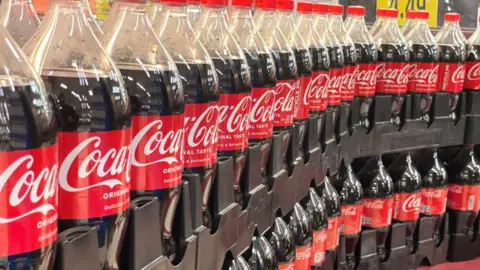Coca-Cola, a longstanding giant in the soft drink industry, announced plans to introduce a new variant of its famous beverage, sweetened with cane sugar, which marks a significant shift in its product formulation for the U.S. market. This decision follows a push from former President Donald Trump, who had earlier previewed the move as part of discussions he initiated about Coca-Cola’s production practices. The introduction of cane sugar Coke aligns with a growing consumer trend favoring products with natural ingredients over those that use high fructose corn syrup, a commonly utilized sweetener in the United States due to its lower cost.
Historically, while Coca-Cola has employed sugar derived from cane in many international markets, it has predominantly used corn syrup as a sweetener in the U.S. for many decades. This practice was driven largely by economic considerations, as corn syrup proved to be a more affordable alternative. However, recent health concerns surrounding corn syrup have prompted discussions about its potential adverse effects. Health Secretary Robert F. Kennedy Jr. expressed such concerns, suggesting that the public might benefit from a shift back to cane sugar, although nutritional experts have not definitively stated that one sweetener is superior to the other.
In a social media announcement, Trump expressed confidence that Coca-Cola’s decision would resonate well with consumers. He declared, “This will be a very good move by them – You’ll see. It’s just better!” This endorsement from Trump underscores the interplay between corporate decision-making and political influence, shedding light on how high-profile individuals can shape consumer product offerings.
Coca-Cola’s formal announcement came during its quarterly update to investors when the company detailed its strategy to “launch an offering made with U.S. cane sugar” in the upcoming autumn season. The shift aims to expand consumer choices and provide options that cater to varying tastes and preferences. CEO James Quincey elaborated on the company’s commitment to diversifying its sweetening options, indicating that Coca-Cola has already successfully integrated cane sugar in other brands within the U.S. portfolio, including products such as lemonade, coffee, and vitamin-infused waters.
Trump’s assertion that he had facilitated discussions between Coca-Cola and influential figures underscores the intricacies of corporate relationships and the potential for political leaders to impact business operations directly. The former president had previously brought billionaire sugar grower José Fanjul—a notable political donor—into discussions with Coca-Cola’s leadership, further establishing a network of influence that connects agriculture, politics, and consumer goods.
Adding to the dynamic is the popularity of what is colloquially known as “Mexican Coke,” which has gained a loyal customer base since its introduction in 2005. This version of Coca-Cola, sold primarily in glass bottles at premium prices, utilizes cane sugar as a sweetener rather than corn syrup, appealing to consumers looking for a product perceived as more authentic or traditional.
The impending rollout of cane sugar Coke in the U.S. signifies a notable shift for Coca-Cola, potentially reflecting a larger trend in the beverage industry where natural ingredients are rising in favor among consumers. As expectations build for this new product launch, analysts and consumers alike will be observing how this change influences market dynamics and could herald a new chapter in Coca-Cola’s product portfolio tailored to changing consumer preferences.












